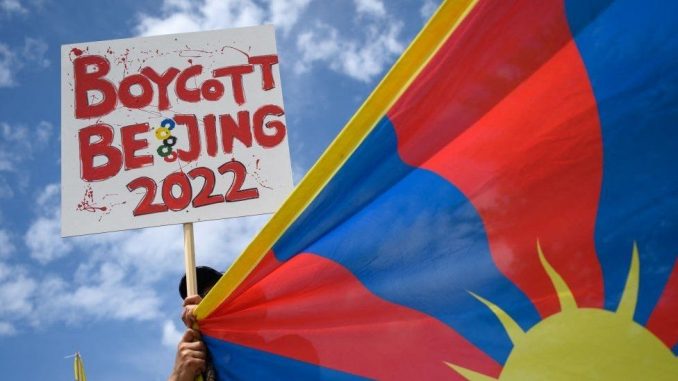
Both Democratic and Republican lawmakers have called for the boycott
The US has announced a diplomatic boycott of the 2022 Winter Olympics in Beijing, China.
The White House said no official delegation would be sent to the Games because of concerns about China's human rights record.
But it said US athletes could attend and would have the government's full support.
China has previously said it will take "resolute countermeasures" in the event of a boycott.
US President Joe Biden said last month that he was weighing up a diplomatic boycott of the event.
White House press secretary Jen Psaki confirmed the boycott on Monday, saying that the administration would not contribute to the "fanfare" of the Olympics.
"US diplomatic or official representation would treat these games as business as usual in the face of the PRC's [People’s Republic of China] egregious human rights abuses and atrocities in Xinjiang," she said. "We simply can't do that."
The Biden administration's diplomatic boycott of the 2022 Winter Olympics falls far short of a previous US boycott in 1980, when it pulled its athletes out of the Moscow Olympics to protest against the Soviet invasion of Afghanistan the previous year
The Soviet Union and its allies, in turn, boycotted the following 1984 Summer Olympics held in Los Angeles.
Ms Psaki said the US government did not feel "it was the right step to penalise athletes who had been training for this moment", but that not sending an official US delegation to the 2022 Games "could send a clear message".
The US is itself due to hold the Summer Olympics in 2028 in Los Angeles.
Both Democratic and Republican lawmakers have called for the boycott as a means to protest against Chinese human rights abuses.
The diplomatic boycott was quickly praised by politicians from both sides of the political spectrum.
Republican Utah Senator Mitt Romney tweeted that the Biden administration was "right to refuse" a diplomatic presence at the Olympics.
Democratic House of Representatives Speaker Nancy Pelosi said she applauded the administration's decision.
"While we must support and celebrate our athletes, America – and the world – cannot give our official imprimatur to these games or proceed as if there is nothing wrong with holding the Olympics in a country perpetrating genocide and mass human rights violations," Ms Pelosi said.
Some US politicians, however, said they believe that the diplomatic boycott is not enough. Senator Tom Cotton, a Republican from Arkansas, called the diplomatic boycott a "half measure" and argued that the administration should have opted to "fully boycott" the games. "American businesses should not financially support the Chinese Communist Party and we must not expose Team USA to the dangers of a repugnant regime that disappears its own athletes." Congressman Tim Ryan, an Ohio Democrat, said that while he is "glad to see the Biden administration take steps to hold China accountable", the diplomatic boycott "does not go far enough". "China has demonstrated again and again that they do not deserve the honour associated with hosting the Olympics, and the Games should be hosted elsewhere," Mr Ryan said.
The US has accused China of repression of the Uighurs and other Muslim minorities living mostly in the autonomous region of Xinjiang.
Tensions have also risen over the way China has acted to suppress political freedoms in Hong Kong, and because of concern for the Chinese tennis player Peng Shuai, who has accused a top government official of assault.
The Women's Tennis Association last week suspended all tournaments in China because of "serious doubts" about Ms Peng's safety.
Other countries, including the UK and Australia, are said to be considering boycotts.
'Political posturing'
China earlier described the possibility of a boycott as wishful thinking and grandstanding, given that no US officials had yet been invited to the games.
"I want to stress that the Winter Olympic Games is not a stage for political posturing and manipulation," foreign ministry spokesman Zhao Lijian said at a regular press briefing.
"If the US is bent on having its own way, China will take resolute countermeasures," Mr Zhao added.
High-level government representatives – from the US and other countries – are usually present at Olympic Games.
Earlier this year, First Lady Jill Biden led the US delegation at the summer Olympics held in Tokyo.

Be the first to comment